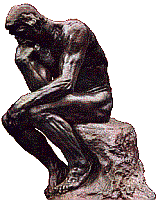 ⇦ Part 2 Some derision of God just doesn't fly. “If God existed, he'd have made the world more just.” – Joseph Stalin, in Montefiore’s Young Stalin, p. 49. “If Joseph Stalin was more just, he'd have made the world better.” – God, in Johnson's Imaginations, p. 314. Some witticisms are harder to dismiss. “If God wanted us to believe in him, he'd exist.” – Linda Smith  Before responding, let me cite a variation of an old joke: “How does an elephant hide in a cherry tree?” “I don’t know, how does an elephant hide in a cherry tree?” “He paints his toenails red.” “But you don't see elephants in cherry trees!” “Works, doesn’t it?” So: How does God hide in a cherry tree? Seeing cherry trees growing from cherries, the ancients intuited an uncaused Cause. In recent years ponderers have come up with god-free ways to get something from nothing. Vacuum genesis, quantum foam, virtual particles, M-theory, multiverses, ekpyrosis, and like explanations have elbowed aside the unmoved Mover. As things stand, if God showed up with lightning in his fists, we would request an ID. “Sure, you can shoot blankets of flame, but how do we know you made the universe?”  When I mention some evidence of God in experience, history, or nature, the response often is a disinterested, “whatever.” Before and beyond logical analysis is, "so what?" So, I’m going to make up a word that is long overdue to be made up. Theapathy is not caring about god. New word, old idea. Jesus complained, “they will not be convinced even if someone rises from the dead.” It's plausible that theapathists –don't say that after eating toast–outnumber theists, atheists, and dogmatic agnostics.  One also can doubt that a creator has other claimed characteristics, such as a concern for us. A skeptical Gideon griped, “Sir, if the Lord is with us, why are we having so much trouble? Where are the miracles our ancestors told us he did when the Lord brought them out of Egypt? But now he has left us...” Stalin is not the only one to cast the question of God's existence in personal terms. In the book, Disappointment with God, Philip Yancey considers three personal questions about God: Is God unfair? Is God silent? Is God hidden? “If God wanted…” propositions are standup comedy expressions of these three blunt questions. One of Yancey's conclusions is that Humanity would be worse off if God was fair, if God was talkative, and if God was always visible. Way worse off. Consider the record of God’s chosen people just after they exited Egypt. God’s presence in a cloud of fire was constant. Forty years, day and night, there’s that fiery cloud! The response? The people wanted to go back to Egypt. During that time, God was not silent. God gave clear rules. The response? The people promptly broke those rules. Per written contract, God hit them with fire, earthquakes, snakes, disease, and enemy armies. Given our record of responding to God, why should he show up? Job fumed: “If I go to the east, God is not there; if I go to the west, I do not see him. When he is at work in the north, I catch no sight of him; when he turns to the south, I cannot see him.” – Job 23 “If God wanted us to believe in him, he'd exist.” God does not want us to believe--if belief means nothing more than intellectual assent. “You believe there is one God. Good! But the demons believe that, too, and they tremble with fear.” – James 2 “If God wanted us to believe in him, he’d exist.” I’m going to suggest as I have previously that, though God wants us to trust him, our belief is not God's highest priority for us. I won’t claim to articulate God’s highest objectives fully, but the following seems relevant: Jesus answered, “The most important command is this: ‘Listen, people of Israel! The Lord our God is the only Lord. Love the Lord your God with all your heart, all your soul, all your mind, and all your strength.’ The second command is this: ‘Love your neighbor as you love yourself.’ There are no commands more important than these.” – Luke 10  Consider then God’s point of view. How can God promote such complete love? Give people goodies? God gave people paradise and one rule. See how well that worked. Let people do what they want? Noah way. Itemize how to love God and your neighbor? Whatever. Sacrifice himself? “People walked by and insulted Jesus, … ‘Come down from that cross if you are really the Son of God!’ … ‘If he is the king, let him come down now from the cross. Then we will believe in him.’” – Matthew 27 I do not suggest that these were experiments, as though God was testing ways to engage us. Nor do I call them demonstrations of what doesn’t work, although these events have some value in that respect. They are data, sufficient for faith, and leading to love. “We love because God first loved us.” – 1 John 4  As this year at The Surge we look at The Story, the sermons focus on key events. You and I now walk the stage. Theapathy flourishes, yet some people want to see God, to hear God, to get justice from God. Do we step up to a microphone and announce in our best Ed McMahon style, "Heeeeere's God!" The multi-colored curtain opens, but will God show? If God showed, would we survive? Talking about God is something we do. But our main job is to love God and love our neighbor. We thereby introduce people to God in the way God wants to be introduced. When love labors, God's existence becomes a little more apparent, even inescapable. “Where can I go to get away from your Spirit? Where can I run from you? If I go up to the heavens, you are there. If I lie down in the grave, you are there. If I rise with the sun in the east and settle in the west beyond the sea, even there you would guide me. with your right hand you would hold me.“ – Psalm 139
0 Comments
 ⇦ Part 1 “If God wanted to forgive our sins, why not just forgive them, without having himself tortured and executed in payment...? Who was God trying to impress? Presumably himself—judge and jury as well as execution victim.” – Richard Dawkins, The God Delusion, page 287 Could God forgive sins “without having himself tortured and executed”? Four people came, carrying a paralyzed man. Since they could not get to Jesus because of the crowd, they dug a hole in the roof right above where he was speaking. When they got through, they lowered the mat with the paralyzed man on it. When Jesus saw the faith of these people, he said to the paralyzed man, Jesus said, ‘Two people owed money to the same banker. One owed five hundred coins and the other owed fifty. They had no money to pay what they owed, but the banker told both of them they did not have to pay him. Which person will love the banker more?’ Jesus said, ‘Father, forgive them, because they don’t know what they are doing.’ If the person cannot afford two doves or two pigeons, he must bring about two quarts of fine flour as an offering for sin. He must not put oil or incense on the flour, because it is a sin offering. He must bring the flour to the priest. The priest will take a handful of the flour as a memorial offering and burn it on the altar on top of the offerings made by fire to the Lord; it is a sin offering. In this way the priest will remove the person’s sins so he will belong to the Lord, Happy is the person Then the Lord appeared to Solomon at night and said to him, ‘I have heard your prayer and have chosen this place for myself to be a Temple for sacrifices. I may stop the sky from sending rain. I may command the locusts to destroy the land. I may send sicknesses to my people. Then if my people, who are called by my name, will humble themselves, if they will pray and seek me and stop their evil ways, I will hear them from heaven. I will forgive their sin, and I will heal their land.’ The wicked should stop doing wrong, The Lord says, ‘Israel, what should I do with you?  As I reflect on these demonstrations of God forgiving people, I am humbled and encouraged. I am humbled because I recall my sins and God's forgiveness. I am humbled in giving an answer to a cynical question, because a heap of other questions arises.
If a good question is one that produces other questions, then, “why not just forgive?” is a good question. I am encouraged because—based on a few centuries of believer's experience and my own prodigal repentance—whatever my comprehension, God exists and God's forgiveness happens. I am relieved that God's forgiveness is not boxed in by my pet theories of how it works. Indeed, around a dozen other blind men have visited this elephant, each reporting how God's forgiveness works. I need to reflect. Whenever I consider God's ways for a while, I inevitably need a Selah. That musical direction occurs in the above Psalm of David and several other poems. Selah means something like, insert a rest, a break, play an instrumental riff here, with the implication, “Think about it!” The Lord shows mercy and is kind. He does not become angry quickly, and he has great love.He will not always accuse us, |
Our Writers:At The Surge we love doing things together... that includes writing a blog! Here are a few of our main contributing authors: Greg JohnsonJesus++ Dwaine DarrahOur fearless leader, Dwaine is the lead pastor at The Surge. His experience in counter terrorism with the CIA prepared him for ministry and he likes dogs and babies even more than E does. EE (short for Eric Reiss) is the Wingman at The Surge and likes dogs, music, Mexican food, his wife Karen and his little girl Evangeline... not necessarily in that order. Archives
June 2024
Categories
All
|
|
|
The Surge Community Church
Meeting Sunday Mornings at The State Theatre in Falls Church, 11:10am! Rebroadcast Available Sunday Evenings with SurgeOnDemand, 7:00pm! |

 RSS Feed
RSS Feed
